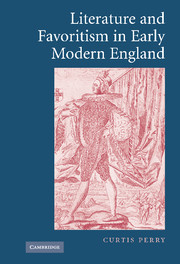Book contents
- Frontmatter
- Contents
- Acknowledgments
- A note on texts
- 1 “Prerogative pleasures”: favoritism and monarchy in early modern England
- 2 Leicester and his ghosts
- 3 Amici principis: imagining the good favorite
- 4 Poisoning favor
- 5 Erotic favoritism as a language of corruption in early modern drama
- 6 “What pleased the prince”: Edward II and the imbalanced constitution
- 7 Instrumental favoritism and the uses of Roman history
- Afterword: “In a true sense there is no Monarchy”
- Notes
- Index
3 - Amici principis: imagining the good favorite
Published online by Cambridge University Press: 22 September 2009
- Frontmatter
- Contents
- Acknowledgments
- A note on texts
- 1 “Prerogative pleasures”: favoritism and monarchy in early modern England
- 2 Leicester and his ghosts
- 3 Amici principis: imagining the good favorite
- 4 Poisoning favor
- 5 Erotic favoritism as a language of corruption in early modern drama
- 6 “What pleased the prince”: Edward II and the imbalanced constitution
- 7 Instrumental favoritism and the uses of Roman history
- Afterword: “In a true sense there is no Monarchy”
- Notes
- Index
Summary
The best-known literary treatments of favoritism that survive from the English Renaissance conceive of royal favorites as agents of socio-political corruption. Most contemporary observers, however, would presumably have accepted, in principle at least, that the bestowal of favor was part of the royal prerogative and that favoritism was therefore a normal aspect of functional monarchy. And since the classical humanist language of friendship authorized an idea of public service in which amici principis provided much-needed counsel, the personal favor of kings could also be regarded as a politically valuable feature of court life. Antonio Feros has argued that this positive notion of favoritism was less prevalent in England than on the continent, but certainly the idea that royal favoritism was normal – and possibly useful – was available in England as well. It should come as no surprise, then, that a significant number of Tudor and early Stuart fictions feature intimate royal favorites who are heroic or virtuous, wise counselors and sound administrators, the very antitheses of the poisonous, scheming, and parasitical favorites who seem otherwise to predominate in the culture's political imagination.
Because royal favoritism raises concerns about the role of personal intimacy in the governing of the commonwealth, positive constructions of the institution tend to rely, implicitly or explicitly, upon a classical language of friendship that helped justify the personal nature of a range of politically important relationships in pre-bureaucratic Europe.
- Type
- Chapter
- Information
- Literature and Favoritism in Early Modern England , pp. 55 - 94Publisher: Cambridge University PressPrint publication year: 2006



